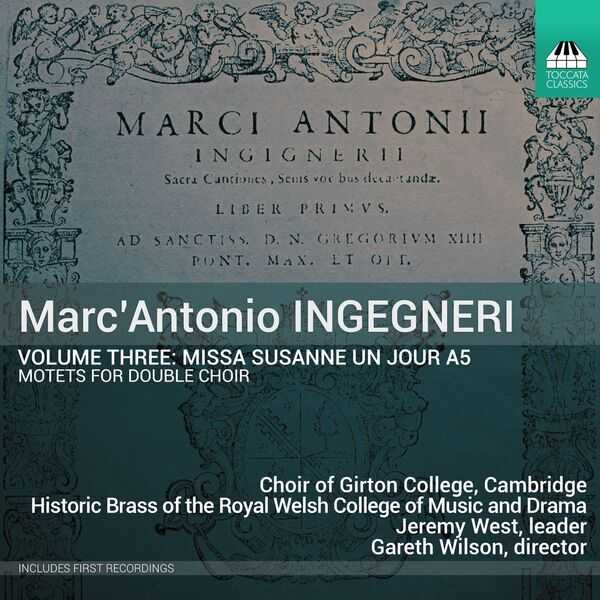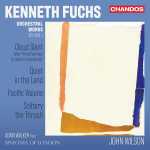

Composer: Marc’Antonio Ingegneri Giovanni Bassano
Performer: Choir of Girton College Cambridge, Historic Brass of the Royal Welsh College of Music and Drama
Conductor: Gareth Wilson
Format: FLAC (tracks)
Label: Toccata
Catalogue: TOCC 0677
Release: 2023
Size: 1.33 GB
Recovery: +3%
Scan: yes
01. Ingegneri: Cantate Domino a8
Ingegneri: Missa Susanne un Jour
02. I. Kyrie
03. Bassano: Susanne ung jour
Ingegneri: Missa Susanne un Jour
04. II. Gloria
05. Ingegneri: Laudate Dominum a12
Ingegneri: Missa Susanne un Jour
06. III. Credo
07. Ingegneri: Exaudiat te Dominus a9
08. Ingegneri: Non mi togli il ben mio a4
Ingegneri: Missa Susanne un Jour
09. IV. Sanctus – Benedictus
10. Ingegneri: Omnes sitientes a9
Ingegneri: Missa Susanne un Jour
11. V. Agnus Dei
12. Ingegneri: O sacrum convivium a6
13. Ingegneri: Regnum mundi a8
14. Ingegneri: Qual grazia, o qual beltate a4
15. Ingegneri: Victimae Paschali laudes a8
16. Ingegneri: Salve regina a6
The Cremonese composer Marc’Antonio Ingegneri (c. 1535/36–92) is chiefly remembered as the teacher of Claudio Monteverdi while, for well nigh 500 years, his own achievements were left to sit in the shadows. This third in a series of pioneering recordings from the Choir of Girton College, Cambridge, reveals Ingegneri to have been one of the masters of his age, writing music of breathtaking richness and beauty: the works heard here combine learned, intricate counterpoint with the kind of sheer sonic thrill that brings a shiver of physical excitement. It is, of course, religious music, but it is also extraordinarily passionate, to a degree not previously heard, nor for centuries to come, until the rise of the great Romantic choral works.
The music of Marc’Antonio Ingegneri (ca. 1535-1592) is seldom performed; devoted Renaissance music fans may recognize him as Claudio Monteverdi’s teacher. However, there is a good deal of interest in his works, and the (mixed-gender, adult) Choir of Girton College, Cambridge, and its director, Gareth Wilson, have done well to bring some of his music out of the shadows in a series of state-of-the-art recordings, of which this is the third. One may wonder whether one can hear hints of Monteverdi’s stylistic revolutions in the music, and the answer, perhaps, is yes and no. On one hand, he was a member of the late Renaissance Counter-Revolution “Roman school,” and he prized limpid polyphony, restraint, and clear text-setting. The Missa Susanne un Jour is a parody mass in which the model, ultimately a chanson by Lassus, is deeply woven into the texture in the classic Renaissance fashion, but much of Ingegneri’s writing in his masses and motets is homophonic, and the big blocks of sound heard here must have made an impression on the young Monteverdi. There are a few madrigals, unusually played by an organ. Why has Ingegneri been forgotten? Perhaps because he came from out-of-the-way Cremona, not Rome or Venice, or perhaps because he was one of those “in-between” figures who doesn’t fall into the usual music-historical categories. In any event, the youthful voices of the Girton College Choir add transparency and beauty, and the engineering at St. George’s, Chesterton, North Cambridge, is top-notch. Listeners have been catching on to the choir’s series, and this volume made classical best-seller charts in the spring of 2023.



